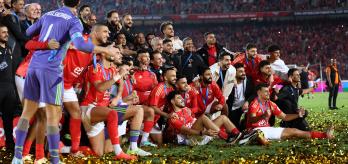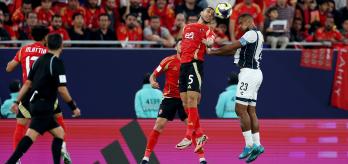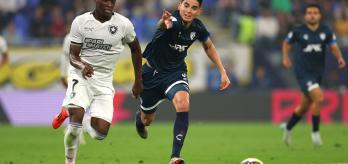The tournament is already underway, with two of the regional titles already decided. The FIFA Derby of the Americas, which takes place on Wednesday 11 December, is the first of the three final knockout matches hosted in Qatar that will determine the winners of the FIFA Intercontinental Cup. Find all the tournament’s fixtures and results so far below:
-
Match 1: African-Asian-Pacific Cup play-off, 22 September
Al Ain 6-2 Auckland City -
Match 2: FIFA African-Asian-Pacific Cup, 29 October
Al Ahly 3-0 Al Ain -
Match 3: FIFA Derby of the Americas, 11 December
Botafogo v. Pachuca -
Match 4: FIFA Challenger Cup, 14 December
Match 3 winners v. Al Ahly -
Match 5: FIFA Intercontinental Cup, 18 December
Real Madrid v. Match 4 winners
FIFA’s Technical Study Group (TSG) will be in Qatar to observe these three games, compiling their observations in the form of in-tournament analyses available to read on the Training Centre. This tournament’s TSG is comprised of two experts with a wealth of footballing knowledge: Pascal Zuberbühler and Aron Winter. Below the duo discuss several topics related to the competition.
The interview
Aron, can you walk us through your playing and coaching career?
Winter: I was born in Suriname, which is a country in South America. At the age of five, I moved with my parents to Amsterdam, the Netherlands. There I began playing football at the age of eight with an amateur club call SV Lelystad, but after several years there, Ajax brought me to their academy, where I was moved through the system by Johan Cruyff into the first team. After several years at Ajax I moved to Serie A, the top league in the world at the time, to progress my career and I spent a brilliant four years at Lazio, before moving to Inter Milan, where I won the UEFA Cup in the 1997-98 season.
Throughout this period I was also representing the Dutch national team. I played in four European Championships and three World Cups, and was part of the team that won the 1988 European Championship. When I returned to Ajax from Italy, I began building up my coaching badges alongside playing. Once I finished playing, I then began coaching and eventually took up the position as head coach of Toronto FC. I also held positions as assistant coach of Greece and Ajax, the latter working under Erik ten Hag. My most recent position was the head coach of Suriname.
You’ve been brought up in the Dutch football environment and spent a substantial period of time playing in Italy. What were the main differences in style of play between these two great footballing nations?
Winter: The two countries’ style of play are completely different. In Holland, the game has to be attractive for the supporters, and you must also get success on the pitch. As a player at Ajax and the national team, you always think about the Dutch DNA: if you dominate the ball, you can dominate the game. Creating overloads in areas of the pitch, with 2v1 or 3v2 situations, is what allows you to keep possession. This message was passed on to us by coaches like Cruyff and Guus Hiddink.
As soon as I went to Italy, I quickly learnt that the winning came above all else. The emphasis on defending was significant, and teams in general did not give much space away in their own half. As soon as teams recovered the ball, they would look to attack with counter-attacks. The result was key. In recent years this mindset has shifted slightly. Teams are more expansive in the way they play. For me personally, I suited the Italian game when I arrived in Lazio. The condensed defences meant that there was often space in midfield. I was quick to receive, control and move the ball on, so I could exploit this space well.
The Intercontinental Cup sees clubs from each confederation face each other. What are your thoughts on this competition?
Zuberbühler: I love to observe and analyse top football from the clubs which have previously won the Champions League in their respective confederations. It’s always good to see if there are any other trends appearing across the globe, and it’s nice to compare the best with the best. That’s why this FIFA Intercontinental Cup is interesting to see. For example, Al Ahly from Egypt have won a majority of titles available to them over the last three years. Now, we get the chance to see how they compete against the winner of the FIFA Derby of the Americas, played between Botafogo and Pachuca. I look forward to watching a South or Central American style of play against an African style of play. In the final game, we will see the winner of this game take on European giants, Real Madrid. It is great to see top clubs from their respective regions coming together and competing.
Salomon Rondon is likely to lead the line for Pachuca against Botafogo on Wednesday. He’s a strong powerful forward that thrives in holding the ball up to allow his team-mates run around him. Does Pachuca’s emphasis on him give some indication of how they’re going to play against Botafogo?
Winter: It is common in Mexican football to have a powerful striker in the centre that brings their quicker, more technical team-mates into the game. Although Pachuca are struggling domestically, they have technically strong players that surround Rondon. There will be a lot of movement around the striker, and players will look to combine with him before breaking the defensive line. For the strategy to be effective, Rondon will need to make sure he occupies two opposition players as much as possible, so he can create the space for his team-mates to run into and create chances. I think Pachuca will respect Botafogo and the threat they pose, as they won’t have encountered the high intensity Botafogo possesses too often in the Mexican league. Both teams will get their chances.
Botafogo won the Brazilian Série A this weekend for the first time since 1995. Last weekend they won the CONMEBOL Copa Libertadores for the first time in their history. What can we expect from this exciting Brazilian side?
Winter: Botafogo have a great intensity. Under their coach Artur Jorge, they have had a strong season. They have quality players all over the pitch and are well organised. The Brazilian team’s technical abilities will mean Pachuca will show them a bit more respect in 1v1 situations. Botafogo have balance between their lines and players know their responsibilities, which makes them difficult to beat. When they play strong opponents, they aren’t afraid to wait for the right moment to apply pressure and in possession they want to play football and move the ball quickly into attack to create goalscoring opportunities. What could prove a challenge is the fact they’ve played three demanding games in the last ten days. It will be interesting to see how they have managed the load in their squad.
Zuberbühler: It seems like they are well organised. To have not won the league title for almost 30 years and then to win it and the Copa Libertadores together in the same season, shows that the club is producing some fantastic work. It would be interesting to see how Botafogo, who have dominated the league this season, will compete on the international stage against Pachuca, and potentially Al Ahly and Real Madrid as well. These all have the makings of great games.
Brazilian football is always great to observe. We know Brazilian teams have always been extremely technical, but Botafogo have also developed the pace and power needed to keep up with the global game. The fact that the Série A champions have all three of these elements will make them an intriguing watch this tournament.
Your fellow countryman, Marcel Koller, is the current manager of Egyptian side Al Ahly. On Saturday, in the FIFA Challenger Cup™, they will face the winner of Botafogo v. Pachuca. What can you tell us about the way Koller manages his teams?
Zuberbühler: I know Marcel Koller very well. I also keep in touch with his assistant, Harald Gämperle. The three of us played together for Grasshopper Club Zürich in the 90s. Koller was our leader, captain and a great example of how to be a professional football player. I’m looking forward to seeing them and their team in action. Koller is a coach who is extremely well organised and knows exactly how to build a team. This lays the foundation for the 11 titles Al Ahly has won since he joined in 2022, which includes two CAF Champions Leagues. They are so strong.
For me, one of the defining characteristics of Koller’s teams is how they work to defend their own goal. Their team out of possession is extremely organised, with their goalkeeper and captain, Mohamed El Shenawy, leading from the back like he does for the Egyptian national team. Koller has also established the right blend between youth and experience. With all these factors combined, Al Ahly are now a very difficult team to beat.
The winner of the FIFA Challenger Cup will face Real Madrid. What are your thoughts on the European giants’ current form, and how do you think they’ll approach this final?
Winter: Real Madrid are one of the biggest clubs in the world, and have a team full of stars. Nevertheless, Kylian Mbappé is still looking to find his form after joining in the summer. The connection between their attackers Mbappé, Jude Bellingham, Rodrygo and Vinícius Júnior is still not in full flow. At the moment, these players don’t always make the best decision for creating or finishing goalscoring opportunities. In the big games though, and under the guidance of Carlo Ancelotti, their team has an unmatched experience of how to win. They can play with a closed defence when without the ball, meaning when they do recover the ball they are lethal on the counter. Even though they might not be in top form, they are still Real Madrid. If they find the team chemistry, they are almost invincible.
As a goalkeeping expert, what are your thoughts of some of the goalkeepers in this tournament?
Zuberbühler: Real Madrid and Botafogo have rotated their keepers in recent weeks, which makes it tricky to know for certain who will be starting in Qatar. Botafogo have John and Roberto Fernández. Fernández is 36 years of age and brings the experience to his team. John, who started the Copa Libertadores final against Atlético Minero last week, is 28 and in the prime of his career.
With Thibaut Courtois, Real Madrid have one of the top goalkeepers in the world – he is outstanding. In the last three seasons, he has massively improved his positioning and his ability to play out from the back using both feet. We also see when Courtois is in the goal, Real Madrid are more successful. This is not only about his technical and tactical qualities, but also about his presence. When he stands in front of you, when he makes an x-block, when he defends the box, his decision-making is always fantastic. To make the right decision at the right moment is crucial for any goalkeeper.
Regarding Real’s second choice keeper, Andriy Lunin, I observed him at FIFA U-20 World Cup Poland 2019™ when he was representing Ukraine. His impressive performances earnt him the Golden Glove at that competition. Unfortunately for Lunin, it’s difficult to get first-team minutes with one of the best in the world in the same squad. Nonetheless, when he has stepped in, he has managed to put in good performances.
Like I said before, El Shenawy is the rock supporting the Al Ahly defence. Although he is in his mid-thirties now, he still performs at the highest level. It will be interesting to see how long he can keep performing at this level. Pachuca’s first choice goalkeeper is Carlos Moreno, who is of 26 years of age and, like John of Botafogo, is starting to come into his prime playing years.
The full FIFA Technical Team for the FIFA Intercontinental Cup 2024
Project Leads
Arsène Wenger – Chief of Global Football Development
Steven Martens – Director of Global Football Development
Tom Gardner – Lead of Football Performance Insights
Technical Experts
Pascal Zuberbühler – Senior Football Expert & TSG lead
Aron Winter – Technical Expert
Football Performance Insights
Harry Lowe – Team Lead Football Performance Analysis
Natascia Prieto – Football Operations Manager









